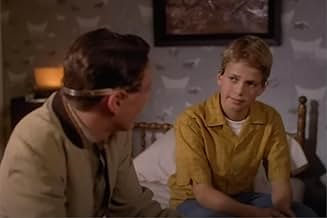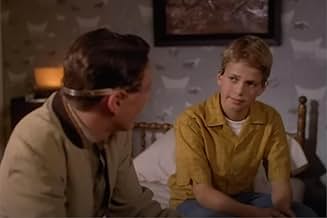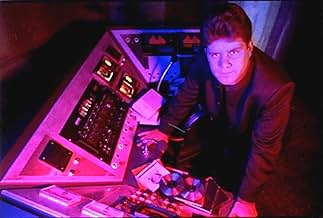IMDb RATING
7.2/10
2.8K
YOUR RATING
In a distant future, egalitarianism has created a truly equal state. The cost? The sacrifice of everything great about humankind. The question: is peace worth the price?In a distant future, egalitarianism has created a truly equal state. The cost? The sacrifice of everything great about humankind. The question: is peace worth the price?In a distant future, egalitarianism has created a truly equal state. The cost? The sacrifice of everything great about humankind. The question: is peace worth the price?
- Director
- Writers
- Stars
- Awards
- 4 nominations total
- Director
- Writers
- All cast & crew
- Production, box office & more at IMDbPro
Featured reviews
It's easy to imagine Mike Judge's hilarious film "Idiocracy" as a dumbed down version of Kurt Vonnegut's "Harrison Bergeron". "Harrison Bergeron" is both darkly humorous, and at the same time frightening. This is intelligent science fiction, that extols the belief that mediocrity for everyone should be the goal of society. The government implements control over citizen's brains with electronic headbands. This diabolical system is overseen by Christopher Plummer, one of a few privileged citizens, not controlled by a headband. Sean Astin is Harrison Bergeron, a rebellious intellectual who tries to overthrow the system. The film has dark comedy, an excellent and appropriate soundtrack, and top notch acting. Recommended sci-fi viewing. - MERK
I saw this movie more than a year ago by chance. I didn't even want to watch it first, but somehow I just got stuck in front of the TV. It was late at night after the Olympics, so i don't think a lot of people saw it. Though I have always loved Sean Astin this movie is certainly a good reason to love him all the more. The "utopia" idea is no new thing in a movie, and usually it's quite interesting how they figure it out eventually. Let's admit: making a good future movie is like walking on eggshells, but I think the cast and crew of this small movie has nothing to be ashamed of. They did really well. It is very impressive how the story of Harrison and of his pure heart and mind talks about life, the equality of men, the lies, the love and of course the arts. I think this movie had become a shiny little secret of the soul of the relatively few people who is lucky enough to have seen it.
Kurt Vonnegut's story turned into an intriguing movie. Not a sci-fi classic but worthy of particular praise for its grim vision of the future. Not a future dominated by machines because man has taught them to evolve (Terminator), nor a future inhabited by docile, lazy epicures who have even lost the ability to read (The Time Machine). This is somewhere in between, a future where the average prevails and where excellence is looked upon with scorn.
After a second civil war, America's leaders have realised that war is idealistic, so they look to an age where ideology was at its lowest point. The golden age of mass consumerism - the 1950s. Children are taught at school to achieve mediocrity, grade C is best, grade A is very bad. Adults are force fed tv with no stimulating content, and strive to buy the newest durable product they see advertised. All brain patterns are controlled by thought suppressing headbands.
The premise is marvellous and keeps the viewer hooked. It is darkly comic, but seriously thought provoking. Not brilliantly acted but certainly worth a look.
After a second civil war, America's leaders have realised that war is idealistic, so they look to an age where ideology was at its lowest point. The golden age of mass consumerism - the 1950s. Children are taught at school to achieve mediocrity, grade C is best, grade A is very bad. Adults are force fed tv with no stimulating content, and strive to buy the newest durable product they see advertised. All brain patterns are controlled by thought suppressing headbands.
The premise is marvellous and keeps the viewer hooked. It is darkly comic, but seriously thought provoking. Not brilliantly acted but certainly worth a look.
Even though the film takes place in the future, it is an interesting and frightening look at our own times. It's a combination of 1984 and MATRIX with a 50s-style movie. The fact that we allow ourselves to be told what to think and do is played out in an interesting fashion. The Thoreau-like character sees the facade and learns how to break through. Sean Austin does a great job as the naive innocent who sees into the darkness behind the facade. Christopher Plummer is very effective as the "big brother" who actually has a soul. The film makes us confront the dilemma of whether we want to be "normal" or to be who we really are.
I saw this movie on TV one evening, probably even missed the start of it. I had no idea what it was, and it had the familiar TV-movie feel but it also had something compelling which kept my interest so I sat and watched it through.
I was amazed by this film, partly because of the scope, partly because of the parallels I could see in the world around me (which have only increased since), partly because it was so apparently innocent and unassuming and partly because I had never seen or heard of it before. It took me by surprise. I think I realised shortly after that it was written by the respected Sci-Fi author K.V. and that I should really have read the story sometime. Oh well. You can't catch them all.
However, much time passed and I forgot the name of the movie (it doesn't exactly stick in the mind) and I forgot which of the famous authors seeded it - but I didn't forget the content. From time to time I would ask somebody 'did you ever see that film...' and always got a blank response. I just remembered the author today and traced the name, which brings me here.
All I can say is this - watch it, and at the same time think about the last time you watched mainstream television 'entertainment'. If the parallels doesn't make your skin CRAWL, well - put the band back on...
I was amazed by this film, partly because of the scope, partly because of the parallels I could see in the world around me (which have only increased since), partly because it was so apparently innocent and unassuming and partly because I had never seen or heard of it before. It took me by surprise. I think I realised shortly after that it was written by the respected Sci-Fi author K.V. and that I should really have read the story sometime. Oh well. You can't catch them all.
However, much time passed and I forgot the name of the movie (it doesn't exactly stick in the mind) and I forgot which of the famous authors seeded it - but I didn't forget the content. From time to time I would ask somebody 'did you ever see that film...' and always got a blank response. I just remembered the author today and traced the name, which brings me here.
All I can say is this - watch it, and at the same time think about the last time you watched mainstream television 'entertainment'. If the parallels doesn't make your skin CRAWL, well - put the band back on...
Did you know
- TriviaHarrison asks "who was that old guy in 'King Lear'?" and is told it's actor Macaulay Culkin. This is meant as a joke, as Culkin was a child actor at the time this movie was made and will be 73 in 2053.
- Quotes
Harrison Bergeron: Anyway, I don't think you're all that stupid.
Alma Starbuck: Thanks! Well I don't think that you're all that smart.
- ConnectionsFeatures Cadet d'eau douce (1928)
- SoundtracksLollipop
Music and Lyrics by Beverly Ross and Julius E. Dixson Sr. (as Julius Dixon)
Used by permission of Edward B. Marks Music Co.
Details
- Release date
- Country of origin
- Official site
- Language
- Also known as
- Гаррісон Бержерон
- Filming locations
- Production companies
- See more company credits at IMDbPro
Contribute to this page
Suggest an edit or add missing content































